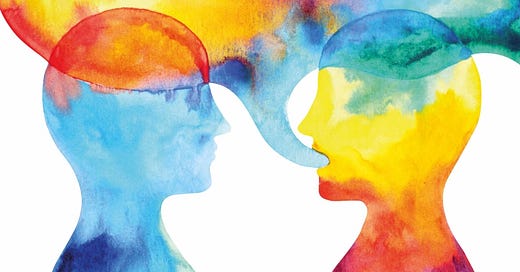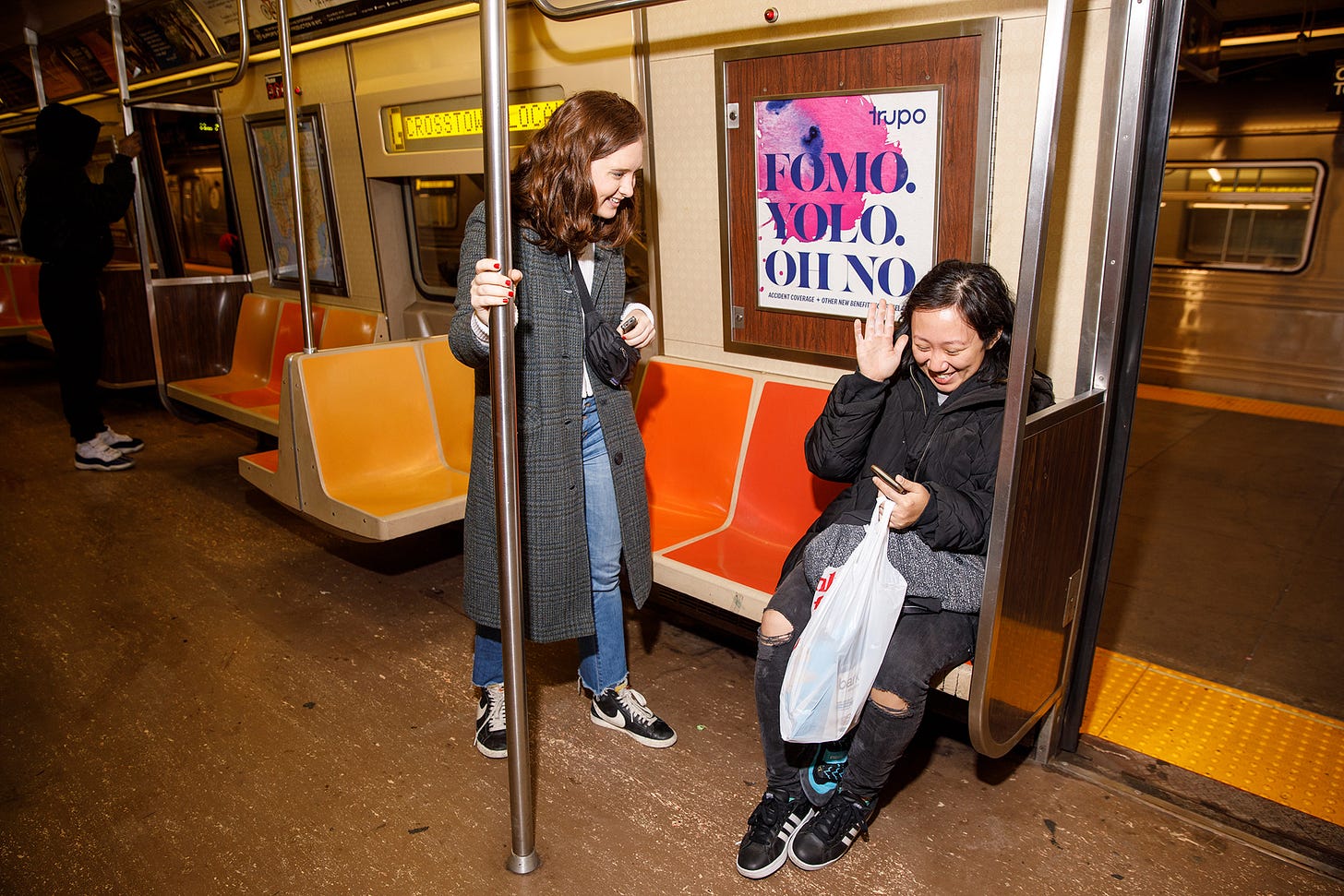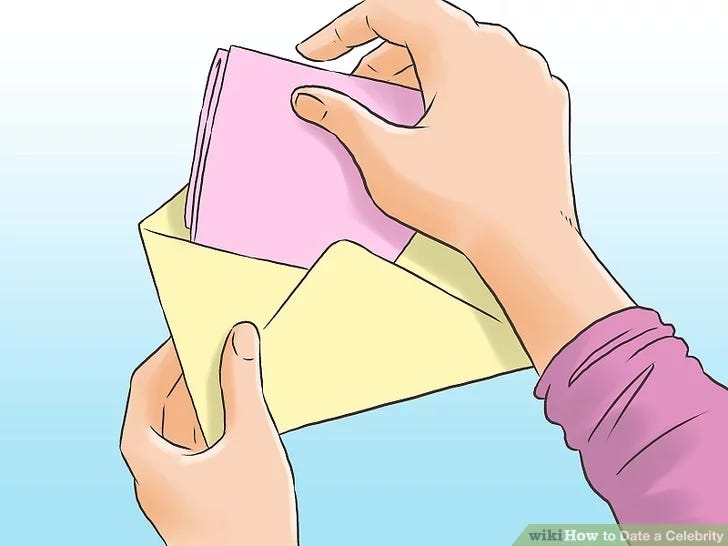Throwback Edition: Talking to Strangers
Plus, Simone de Beauvoir on aging, the therapist helping people decide whether to have kids, and how to date a celebrity
Dearest Readers,
Hello! How are you feeling today? The weather in New York was been unseasonably Spring-like, and I am fully leaning into the extended season knowing the heat is going to be stifling when it does decide to arrive. This morning, I was picking up my laundry when I felt the urge to ask the woman working what her name was. I see her somewhat regularly and yet, I know very little about her. I didn’t engage this morning, but the next time I go in, I will. This passing thought reminded me of a special man I met years ago named Max. And also, how little energy it takes to be kind, to find delight in the act of opening yourself up to strangers. Today’s Throwback is an ode to Max.
This afternoon, I’m baking a lemon cake with blueberries in it. I’m going to go for a run and do some squats in the sunshine, then have a picnic with a few dear friends. Tomorrow, I’m seeing this movie and the director is doing a talk afterward, which I am very much looking forward to. Another exciting directorial debut by a young woman filmmaker—inspiration is everywhere you look!
I hope you have a sweet, sunny weekend. Until next time,
A Note From the Editor
Life is nothing but a debatably linear period flanked by contradictions. As children, we are told never to talk to strangers. Stranger even rhymes with danger in this language, so the message is straightforward. Tales of those kidnapped kids we were fed in elementary school both terrified and secretly thrilled me. The movies were normally played during art class, when the teacher would sit us down and dim the lights, our excitement over the simple change in the day’s structure palpable. “Movie” is a generous designation—they were more like low-budget scenes starring a curious child, a distracted parent, and a bad guy. In one scene, the child and their parent get separated in the sprawling hellscape that is Super Walmart. After turning a few laps through packaged snacks and hunting equipment and patio furniture, the child is tempted by a friendly stranger with the promise of something—candy or a helping hand to lead them back to their parent. In another scene, a child is walking home from school just as a stranger pulls up alongside them. ‘Your parents sent me, they've been in an accident.” No matter the setting, the slightly varied plot, or the oversimplistic characters, the moral of the story was always the same: Strangers mean you harm and you are not to trust them.
Imagine our collective surprise, then, when we shimmy our way into adulthood and find talking to strangers a requisite of daily life. In a traditional college setting, we live with a stranger in a small, shared room. At work, we smile and nod to a room full of strangers—bosses, executives, HR people, coworkers. At the coffee shop, we idly exchange pleasantries with strangers, when we’re in the proper mood. Those of us who are good with strangers might find life easier and more prosperous. Conjure the image of the human equivalent of sunshine, that person who can talk to anyone, who seems confident and comfortable in their skin, who others seem to flock to—she’s great, she can talk to anyone! Humans as inherently social creatures, so those who excel at the skill of socialization are generally more celebrated.
Talking to strangers is one of the greatest joys of my life, something I've never struggled with. I became dear friends with a former stranger who I happened to be seated next to on a flight from London to New York after a 3+ hour delay. I've partaken in fleeting interactions with strangers that have lingered in my mind for years after the fact. I've intentionally pursued strangers who have fascinated me at dinner parties or in passing. I have always told myself that I was good with strangers. More open to interacting with them than the average person.
Only recently has that shifted imperceptibly, like the way a spine begins to slope with age without us actively realizing it. The pandemic dried out my sense of extroversion, squeezed every drop of it into a little bottle that I have yet to fully take off the shelf. I have become less open to interactions with strangers, evidenced by closed-off body language, pointed replies, headphones, and sunglasses to block out the possibility of unwelcome interaction. I’ve also noticed that at some point during the isolation of recent years, I’ve become far less bold. My ability to seamlessly usher strangers into more familiar territory has waned.
This became apparent to me when, after leaving New York for two weeks to visit family in Florida, I returned and noticed the laundry place under my apartment was closed. I knew something was wrong right away, for Max, the 90-something-year-old man who I’d interacted with every other week for the past year, never closed on a Tuesday. He was stringent with his schedule, closed only on Sundays. The one time he needed to close on a Saturday, he had a warning sign up to his customers for two full weeks: I will be closed Saturday. Handwritten on a sheet of computer paper, taped to the desk so you couldn't say you didn't see it. I thought maybe he’d placed a sign-up that I missed, while I was gone, to explain his closure on a Tuesday. But then Wednesday passed, Thursday, Friday. After a week, I knew Max wasn’t coming back.
Max was not really a stranger, but it took us months for us to connect, far longer than what is normal for me. There was a language barrier between us, one that made me speak loud and nervous in my communication. At first, I would drop off my laundry to Max and we would exchange only the most basic of pleasantries, but even then I admired him. He seemed too old to be running the shop by himself, hoisting heavy bags of laundry onto the scale, sometimes falling asleep on his chair in the back, and yet he showed up every day. He wore fingerless gloves and had a collection of cool, embroidered jackets. That’s how we finally graduated past the hello/goodbye/pickup at 5 pm tomorrow; I commented on his jacket. He seemed flustered and flattered by the attention, and I promised myself I would try harder to get to know him, for I found him fascinating and his presence genuinely improved my day.
In the months that followed, I got to know Max a little bit better, always in the context of our 2-3 minute interactions while dropping off my laundry. I discovered he was from Korea, formerly a dressmaker for Calvin Klien. his eyes lit up when he told me this, and so I began using him as a tailor, too. He had newspaper clippings pinned up to the walls of his shop with sewing needles, and on one unseasonably warm day, he pointed to a new clipping. California, 115 degrees. Without an excessive amount of words, we agreed that climate change was scary and that things were far more out of hand than we cared to admit. He stopped asking my name when I came down because he knew me now. When I would arrive at a time when other customers were there, I observed the way they spoke to him—slowly, loudly, without genuine interest, staring at their phones. It made me feel angry, protective of this precious person I’d gotten to know. But then I remembered how I had done the same thing.
The day I realized Max and I had formed a real bond was the day he sent me home with a gift. I had shown up to drop off my laundry in my favorite baggy linen pants, which are prone to horrible wrinkles. I am wrinkle-averse and never travel anywhere without my steamer, but my steamer happened to be broken and the new one had not yet arrived. Max noticed my uncharacteristic wrinkles straight away and called me out. I was equally embarrassed and charmed, not realizing he paid such close attention to my clothing. It took us some back and forth and patience on both of our parts, but eventually, Max explained how I could get the wrinkles out of my pants without a steamer. He shuffled to the back of the shop and returned to the counter with a cleaned-out spray bottle, probably one that formerly held kitchen cleaner, its label just hardly peeled off. “For you,” he said, “to keep.” I didn't need the bottle, for my new steamer was set to arrive that evening, but I was so touched to have physical proof that Max cared for me the same way I cared for him, and so I stored it under the sink, despite my perpetual desire to purge unnecessary objects from my home.
I saw someone sweeping in Max’s shop the other day and I burst in, my heart fluttering with childlike hope. “Where’s Max?” I asked. The man stared at me for a beat. “Who’s Max?” he said. I explained the situation, and the man told me he had no idea what happened to the guy who used to run this place, but that it was now going to be used as a storage unit for the acai bowl shop next door. “Did he run off with your laundry or something?”
A few days later, while fishing for information from the building owner, I heard Max retired. It seems highly unlikely because the interior of the shop looks like he left in a hurry—newspaper clippings still on the wall, stray hangers covered in flimsy plastic dry cleaning bags hung on the racks behind the register. Max took great pride in his work, he wouldn't have left a mess behind. A new sign appeared on the door this week, haphazardly handwritten. “Cleaners out of business!!!!” it says. Written by someone who didn’t know Max’s name, someone with little patience for the questions of his former customers, as indicated by the string of exclamation marks.
How I went so long knowing Max, treasuring his company, but not really knowing him now baffles me. I don’t know where he lived or whether he had a family, and I can’t get in touch with him to see whether he’s ok if I tried. Like any of those everyday strangers we interact with, who oscillate between stranger and acquaintance with the potential of one day becoming a friend, I assumed Max would always be there. Whenever I was ready, feeling brave or bold, I would bring him cookies I’d baked, ask him better questions. Mostly, though, I would work up the courage to tell him what our vignette of a relationship meant to me. How seeing his shy smile and hearing the bell clinking as I entered the shop made me feel more at home, how much it meant to me when he started remembering my name.
I’m vowing to keep this in mind as I continue to walk through the world, interacting with all sorts of promising strangers—despite what I believe, even those familiar ones won’t be there forever. If there is a stranger I want to know better, I’m going to be as bold as I once was, asking real questions, looking them in the eye as they respond, for never know who a stranger might become to you.
Cheers, my dears, and as always, thank you for reading. If you liked what you read today, please consider opting for a paid subscription! This newsletter is a labor of love, and the time I spend writing, editing, and reading articles each week is time I don’t spend taking on other freelance writing projects. Your subscription means I can continue to spend the time and energy needed to produce this newsletter!
Three Pieces of Content Worth Consuming
Simone de Beauvoir Recommends We Fight For Ourselves As We Age. Have you heard that old Ram Dass quote, "We are all just walking eachother home?" Death is inevitable and while we know this, it isn't something humans generally are comfortable with pondering too deeply. If death is to be avoided, then aging is certainly not something to ponder until it becomes our reality. We live in a vibrantly ageist society, where one's value is mostly derived from financial mobility, productivity, and appearance—all of which decline with age. The French philosopher Simone de Beauvoir's work inspects aging with truth—it isn't always fun, it is often shattering—but brings us a conclusion that we should all embrace; the only way to age gracefully is to accept the inevitability of our steady decline and to find personhood within it.
The “Pity Me!” Personal Essay. The moment I read this headline last week, I squirmed and squealed simultaneously. As a writer of a weekly cultural commentary newsletter with vaguely depressive tendencies, I immediately felt like I could very well be guilty of penning a "pity me" personal essay before even reading about how the author quantified it. After reading the piece, I will admit that at least a handful of my essays would be characterized under such a genre, but regardless, I loved the author's astute overarching commentary about how victim culture has infiltrated the essay writing trend. More broadly, the examples she cites in her essay about personal essays (META!) were interesting, useful reminders of what an essay can be. Funny, whimsical, serious, anything under the sun.
I Help People Decide If They Want to Have Kids. Here’s My Advice. I haven't read many articles in this vein and I appreciated it. When it comes to having children, it feels like most people have polar opinions; a hard yes or a hard no. But as this author points out, this isn't the truth for everyone. Many people wade around the in-between space and are riddled with guilt for not knowing for certain. I loved the tactical journaling prompts this therapist suggests, and the delicacy with which she approaches the topic.
Perhaps You Should… Try Out Subway Social Club
Speaking of talking to strangers, how genius is this? Talking to strangers on public transit might sound like your version of personal hell, but I like the idea of physically indicating whether or not you’re open to it.
**Bonus Content** (How To Date a Celeb)
I came across this Wikihow while researching for an essay idea I had, and WOW! This is one of the funniest and most insane things I've ever read.
A Quote From A Book You Should Read:
“She looked to the world like a harmless small creature, but she had a way of getting what she wanted.”
-Crossroads by Jonathan Franzen
This newsletter is best served with a side of conversation, so drop your opinions, reflections, and thoughts in the comments below and let’s get to talking.
Or, share the most thought-provoking piece from today’s edition with someone you love, then call them up to discuss, debate, and percolate. As a wise woman once said, “Great minds discuss ideas.







Thank you for sharing this story.
Beautifully written, as always, although one typo (pining/pinning). LOL, my ADD hard at work.
Thinking of living in NYC is extremely intimidating. Bravo for your boldness and bravado.
Growing up in a small town where everyone knew everyone else, strangers didn’t have a shot.
Lastly, just picture your friend Max in a happy place.